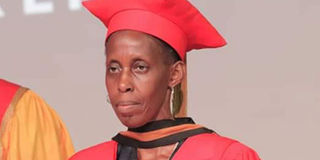Prime
Scholars from humanities, social sciences keen to remain relevant

Prof Monica Chibita. PHOTO/FILE/COURTESY
What you need to know:
The plea was made during the hybrid National Humanities Conference convened under the theme ‘Humanities and Humanistic Social sciences Scholarship for a New Era’ at Makerere University yesterday
Academics in the fields of humanities and social sciences have demanded to be treated on a par with their counterparts from the field of sciences.
The plea was made during the hybrid National Humanities Conference convened under the theme ‘Humanities and Humanistic Social sciences Scholarship for a New Era’ at Makerere University yesterday.
Delivering the keynote address, Prof Monica B Chibita, the Dean of the Faculty of Journalism, Media and Communication at the Uganda Christian University (UCU), decried the piecemeal support accorded to research and academic programmes in social sciences.
“Evidence indicates that scholarship training and research funding have tended to flow away from the humanities and social sciences because their utility in the context of development needs is not immediately obvious,” Dr Chibita said.
She added: “Humanities have been very hard hit. Humanity researchers are often taken as second-class citizens.”
Even as a growing knowledge-based economy continues to define relevance in terms that are not favourable to humanities and social sciences, Prof Chibita urged her counterparts to face the “daunting challenges” head on rather than turn into “perpetual mourners.”
She also tasked colleagues to revise their academic curricula, focus their teaching and research on areas that are more problem-solving as opposed to heavy academic-premised research.
“We may not be able to make charcoal stoves or cars but we can surely talk about designing organic-based research that speaks to our realities. We can begin talking about models that solve long life challenges,” she said.
At the same event, the 42nd volume of the Mawazo journal was launched.
According to Prof Umar Kakumba, the deputy vice chancellor in charge of Academic Affairs at Makerere University, the journal was started in 1967 to promote the spirit of Pan of Africanism among the citizenry since many states were emerging from the colonialism era.
The conference, which will span three days, is expected to trigger debates and discussions that will generate answers to how humanities and social sciences can remain relevant in the era of globalisation, decolonisation, technological advancement and coronavirus.



